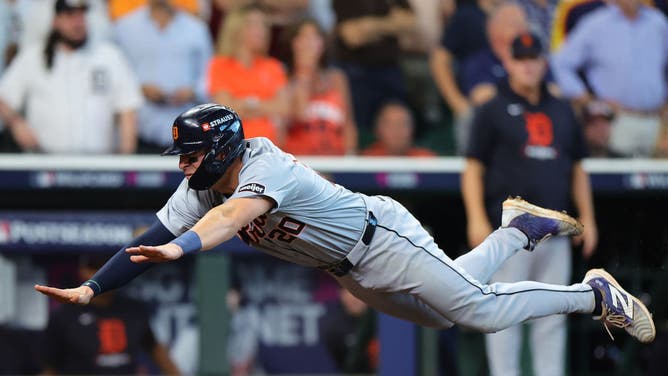We support our Publishers and Content Creators. You can view this story on their website by CLICKING HERE.
For the first time since the 2016 season, the Houston Astros are out of the postseason before the American League Championship Series. And for all the difficult teams they’ve faced in recent years, the Astros were eliminated by the 86-win Detroit Tigers.
The Tigers entered the Wild Card series as massive underdogs on the road against the Astros. Understandably so, considering their entire roster is making just $18.8 million in salary this season. As Spotrac noted, there are 62 individual players making more than that this year.
The Astros also brought a wealth of postseason experience to the table, with playoff veterans like Alex Bregman, Yordan Alvarez, Jose Altuve and Framber Valdez. The Tigers, meanwhile, have a roster filled with rookies and inexperienced young players. Parker Meadows, Matt Vierling, Riley Greene, Colt Keith, Spencer Torkelson, Trey Sweeney…not exactly elite, battle-tested veterans.
But they do have Tarik Skubal, who dominated the Astros lineup in game one. And the Tigers in game two did what they’ve done almost every day since the middle of August: come through in clutch situations.

HOUSTON – Spencer Torkelson of the Detroit Tigers slides home to score a run against the Houston Astros in the eighth inning during Game Two of the Wild Card Series at Minute Maid Park on October 2, 2024. (Photo by Alex Slitz/Getty Images)
Detroit Tigers Clutch Hitting Propels Them To ALDS
The Tigers held a tight 1-0 lead entering the 7th inning, but back-to-back singles followed by a botched throw to home by Detroit allowed the tying run to score. Jeremy Pena came home on a short sacrifice fly, beating the throw after an aggressive send.
But the Astros hit into a double play to end the inning, and the Tigers immediately struck back.
Back-to-back singles and a wild pitch scored the tying run, a strikeout and a walk loaded the bases for Detroit with two outs, and Astros manager Joe Espada turned to all-world closer Josh Hader to shut the door. He did not. Hader walked Spencer Torkelson on four pitches, then gave up a bases-clearing three-run double into the left field corner to Andy Ibanez.
The Tigers shut down Houston without much difficulty over the final two innings, securing a trip to Cleveland to start the ALDS.
There are several key takeaways from this playoff series, for Detroit, for Houston, and for the playoffs at large. One is that many of the factors that baseball commentators, experts and fans believe are important simply don’t matter much, if at all.
The Astros entered with a better rotation, a better lineup, home field advantage and a wealth of playoff experience. They scored just three runs combined in two games at home. Detroit had Tarik Skubal on Tuesday, yes, but essentially used a bullpen game to advance. Starting pitching matters, until it doesn’t. Home field is almost entirely irrelevant. Playoff experience is irrelevant, but execution isn’t.
Another important lesson is that the baseball playoffs are significantly more influenced by randomness and lucky breaks than observers would like to admit. Even with matchups containing large talent gaps, the better team only wins 55 percent to 60 percent of the time. That means 40 percent to 45 percent of the time, the underdog wins. Predicting October baseball is like flipping a coin and guessing wrong.
The Tigers have essentially one starting pitcher, no star players or big-name hitters. They don’t have a highly paid closer or an intimidating home field advantage. They snuck into the playoffs after a miraculous run to end the season. And they have the same odds to win the World Series as the $300 million Mets or star-laden Dodgers. Cause postseason baseball is random.
And the Tigers clubhouse was fired up after the game.
The Gritty Tigs are moving on, hoping the chaos and randomness takes them to a stunning berth in the ALCS.

 Conservative
Conservative  Search
Search Trending
Trending Current News
Current News 





